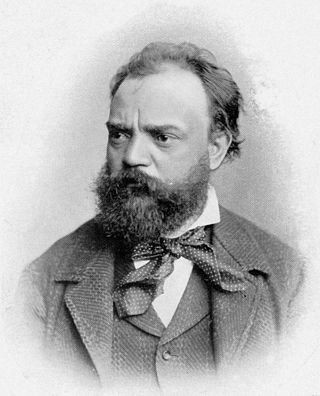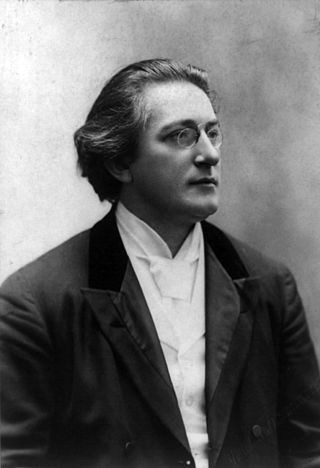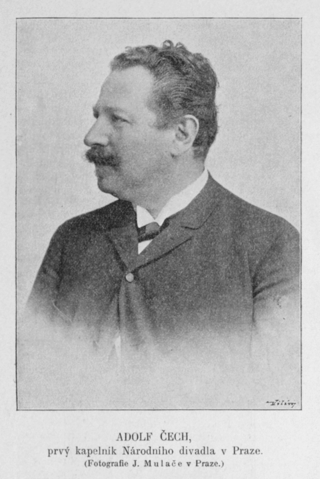
Edvard Hagerup Grieg was a Norwegian composer and pianist. He is widely considered one of the leading Romantic era composers, and his music is part of the standard classical repertoire worldwide. His use of Norwegian folk music in his own compositions brought the music of Norway to fame, as well as helping to develop a national identity, much as Jean Sibelius did in Finland and Bedřich Smetana in Bohemia.

Antonín Leopold Dvořák was a Czech composer. Dvořák frequently employed rhythms and other aspects of the folk music of Moravia and his native Bohemia, following the Romantic-era nationalist example of his predecessor Bedřich Smetana. Dvořák's style has been described as "the fullest recreation of a national idiom with that of the symphonic tradition, absorbing folk influences and finding effective ways of using them," and Dvořák has been described as "arguably the most versatile... composer of his time".
This article is about music-related events in 1874.
This article is about music-related events in 1872.
This article is about music-related events in 1878.
This article is about music-related events in 1875.
Events in the year 1882 in music.
This article is about music-related events in 1869.
This article is about music-related events in 1865.

Anton Seidl was a Hungarian conductor, best known for his collaboration with Richard Wagner and conducting his operas, and for his association with the Metropolitan Opera in New York City and the New York Philharmonic.
E minor is a minor scale based on E, consisting of the pitches E, F♯, G, A, B, C, and D. Its key signature has one sharp. Its relative major is G major and its parallel major is E major.

Johann Baptist Isidor Richter, or János Richter was an Austro-Hungarian orchestral and operatic conductor.

Benjamin Johnson Lang was an American conductor, pianist, organist, teacher and composer. He introduced a large amount of music to American audiences, including the world premiere of Pyotr Ilyich Tchaikovsky's Piano Concerto No. 1, which he conducted in Boston in 1875.

Hanuš Wihan was a Czech cellist. Some considered him the greatest of his time. He was strongly associated with the works of Antonín Dvořák, whose Cello Concerto in B minor, Rondo in G minor, and the short piece Silent Woods were all dedicated to him. He was the founder and later cellist of the Czech String Quartet, which was world-famous throughout its 40-year existence.

The 50 Greatest Pieces of Classical Music is a compilation of classical works recorded by the London Philharmonic Orchestra with conductor David Parry. Recorded at Abbey Road Studios, Royal Festival Hall and Henry Wood Hall in London, the compilation was released in digital formats in November, 2009 and as a 4-CD set in 2011. The 50 Greatest Pieces of Classical Music has sold over 200,000 copies and spent over three days as one of the top 10 classical albums on iTunes.

Adolf Čech was a Czech conductor, who premiered a number of significant works by Antonín Dvořák, Bedřich Smetana, Zdeněk Fibich and other Czech composers. He also led the first performances outside Russia of two operas by Pyotr Ilyich Tchaikovsky and the Czech premieres of seven operettas by Jacques Offenbach. He was also a bass singer and a translator of opera librettos.








